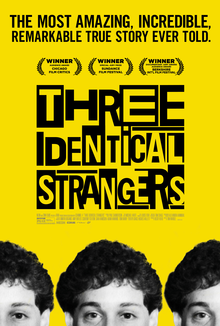
This documentary has been well-liked enough to appear on various critics’ best of year lists. But what convinced me to put this on my list is a strong recommendation by Tyler Cowen of it offering plenty of social science to think about while urging the audience to be skeptical of its conclusions.
This film is of course about the set of triplets, Edward Galland, David Kellman and Robert Shafran, who were separated at birth, adopted by different families and then accidentally discovered one another as adults. Part of this documentary has all the sweet wholesomeness of a Lifetime movie covering the shock and joy of one of them realizing he has a twin at college and how the news coverage of the encounter prompted the twin triplet to contact them. They enjoy a brief period of celebrity, making the rounds of talk shows and party it up in New York. Then there’s the more sinister and hence more interesting part that goes into how the triplets were deliberately separated as part of a nature versus nurture study. The study however was never published and its records are sealed. The families were only told that the children were occasionally tested as part of a standard adoption study and had no idea that they have siblings. This raises ethical issues as neither the children nor their adopted families ever gave their consent to be part of such a study. Then there is the implication that the children were specifically selected from birth mothers with mental illnesses to gather data on how genetics influence mental conditions. The clincher is that one of the three eventually committed suicide but all three suffered from depression to some degree.
Once again this is an incredibly rich subject but I think that director
Tim Wardle sells it short by going for a simplistic narrative. It’s annoying for example how often the film repeats scenes for dramatic effect as if the audience could have forgotten something we’ve seen a mere half hour ago. On the nature versus nurture debate, the film at first plays up the uncanny similarities of the triplets, not just in their looks but their mannerisms and preferences. Later however it turns around and points out that most of the media coverage highlighted these similarities but ignored the ways that they are different even though this documentary did the same thing in the beginning. It uses the suicide of Edward Galland to reinforce the idea that each of the brothers had a very different outcome in life and that nurture matters just as much if not more than nature. This is the expected and conventional take for a documentary and it’s unsurprising that the lead researcher on the study Peter Neubauer is cast purely as the villain of the piece.
To me, however, the more shocking and therefore valuable takeaway is still how much heredity matters. Robert Shafran’s comments about his brother’s suicide was especially chilling as he says that it could have been any of them, indicating that he understands and to some degree sympathizes with Edward’s reasons for wanting to kill himself. I think his family should find such comments alarming and make sure that he has access to counseling. The scenes of the other pair of twin sisters shown in the documentary and their shared depression also reinforce this view. That nurture also matters is not in doubt. No one seriously believes that vastly different circumstances in life has no effect on outcome but it is surprising that no matter your situation, your genes still exert an omnipresent influence. This documentary seems to take the view that this sort of pre-destined outcome is something to be feared. On the contrary, I believe that acknowledging this influence empowers the individual to take measures to counteract them if desired and make better decisions. That the other two brother should take better care of their mental health makes for an excellent example.
I also take issue with the way that the documentary paints the action of Dr. Neubauer as evil. It’s true that by modern standards of science, such a study is unethical but that’s a long way from evil. I think that whether or not the triplets were separated at birth, their apparent propensity towards depression would be unchanged. I’m also bemused at how they try to make it seem that the study not ever being published is somehow mysterious. It’s obvious that the huge media circus surrounding the triplets’ discovery of one another made continuing the study pointless and destroyed any scientific value any further observation would have had. I do agree that at that point they should have formally ended the study and released the data to those participants who wanted to have it. The notion that they’re still test subjects right up to their deaths is a little silly given all of the publicity so that most plausible reason for denying access would be that the Jewish Board of Family and Children’s Services wanted to avoid any lawsuits stemming from their funding of the study.
As I noted, this is a fascinating subject and director Tim Wardle knows how to wring it for maximum dramatic effect. Unfortunately he eventually takes it down the safer path of offering audiences the bromide that regardless of the similarities between the triplets, nurture still matters. Truly embracing the strangeness of how much heredity matters and how this knowledge can be used to modify our behaviors and policies would have made for a more novel and interesting direction.